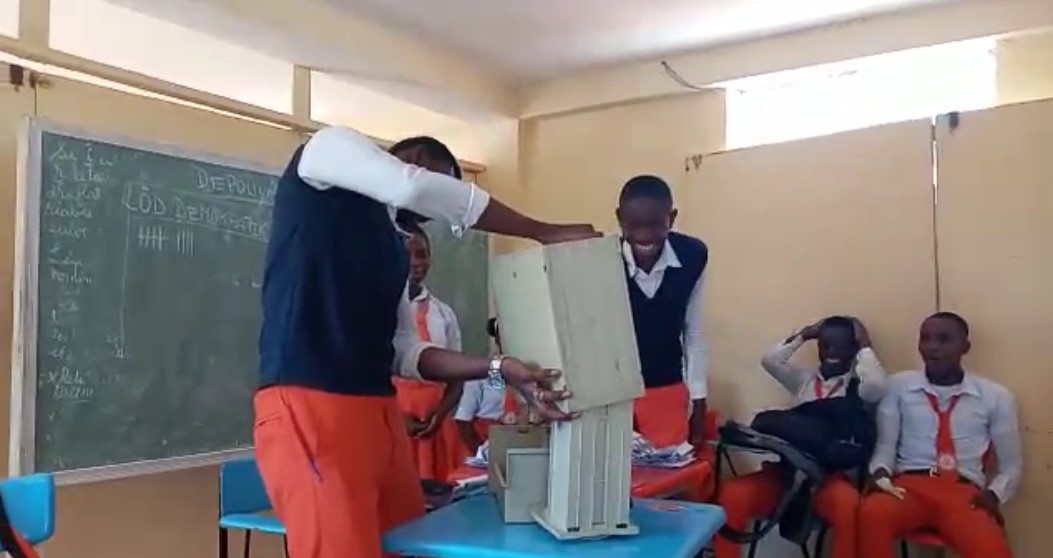ECONOMY - AGRICULTURAL COOPERATIVES
Responding to local smallholder families’ expressed needs to gain more agency, access training, and improve the overall agricultural production, EWI is helping organize unaffiliated local farmers into agricultural cooperatives that farmers own and manage.
Two regional cooperatives have been established, and the remaining three will be added when security is restored. The two cooperatives serve 1,400members of participating farming families.
COOPERATIVE #1 – CAMA (Coopérative Agricole de Mare Roseau en Avant).
Mare Roseau is a communal section of the Commune of Ganthier, and is located at about 6,000 feet in the La Selle mountain range.
At CAMA most men are farmers, and most women take care of farm animals and run their homes.
Once established, CAMA members chose to partner with EWI on establishing the Women’s Goat Project. Large farm animals are like savings accounts for the farming families. Women were trained in goat husbandry and took possession of 18 improved-breed goats . Each year the herd size doubles.
Other projects focus on acquiring seeds for planting, continual farmers’ training, and planning for the next steps.


COOPERATIVE #2 – CADET, (Coopérative Agricole pour le Dévéloppement de Toman]
Toman is located at about 3,000 feet in the La Selle mountain range.
At CADET most men raise large farm animals and most women are small-merchants and take care of their homes.
For the past three and a half years, the gang blocks farmers from reaching markets to sell their animals and generate income. Consequently, we have increased our support of the small-merchant women who have now become the main bread winners.
Jointly, we have established a rollover fund so they can access affordable loans. Each year we increase the fund’s capital to grow the number of women who benefit from these loans. The fund is entirely managed by the women and their repayment rate is 93% which, given the circumstances, is excellent. The ‘normal’ repayment rate among these women is 96-98%.


SHARED KNOWLEDGE
EDUCATION - THE PATRICE LUMUMBA COMMUNITY-BASED SCHOOL
The school that started with 18 pupils in a sublet classroom, today has its own building and educates between 260-300 students from five to sixteen years old. Since the inception of this partnership in 2009, the school and EWI worked jointly on many projects, among them:
Construction, Curriculum, Rainwater Collecting System, School Lunches, books, and so on.
Helped complete the construction of the school building, and provides continuous support to grow the curriculum and the student body.
Civics Course
EWI and the school designed and offer a civics course to teach students their responsibilities as Haitian citizens, and to learn about the main democratic tenets. This is in addition to the national curriculum.

Rainwater Collecting System
EWI funded and the school installed a rainwater collecting system so students, faculty and staff could drink and wash their hands with safe water.

School Lunches
The current catastrophic economic decline resulted in parents’ loss of income so severe they could no longer feed their children three daily meals. EWI and the school responded overnight by establishing a kitchen in the schoolyard that provides 300 daily school lunches to students and staff.

IMPORTANT NOTE: In addition to EWI’s support, the Patrice Lumumba school receives funding from most parents, teachers, local community leaders, and the U.S. Ganthier diaspora. Students whose parents cannot contribute, remain in school to continue their education. This is a truly community-based school.
WOMEN’S LITERACY
EWI initiated a Women’s Literacy program in Ganthier’s communal section of Galette-Chambon. Forty women of all ages participated in this one-year course. Using the Alfalit method, the participating women who couldn’t read or write when the course started, successfully completed it.
As they received their diplomas, many expressed their gratitude, pride and agency in a thank you letter written by hand and addressed to Henryka Manès our Founding Executive Director, who they befriended during her regular visits and classroom participation.
There were many emotional moments during that year – by far the two most salient were when each woman could, for the first time, write her name; the other was when they could write the thank you letter.


ABOUT THE GANTHIER REGION
The Commune of Ganthier and EWI signed a cooperative agreement in the first months of our arrival in 2009. We agreed to prioritize the needs of the local small holder farmers, support the community-based school, and advance women’s equity. These common objectives became the genesis of the Talia Farms Program.
Being close to the capital, the region has been affected by the 2010 earthquake, Hurricane Matthew, Covid, and lately has been overrun by the brutal 400 Mawoso gang.
Through thick and thin, we have supported each other and doggedly continue our cooperation, finding solutions to the challenges we encounter. It has been fifteen years of close friendship, and mutual trust and respect
Tragically, at this time the town of Ganthier and much of the region is under the occupation of the 400 Mawoso gang. All schools and institutions are closed. Almost all of the town of Ganthier (about 25,000 people) are in hiding, scared and hungry. See Disaster Relief section for more information.




















